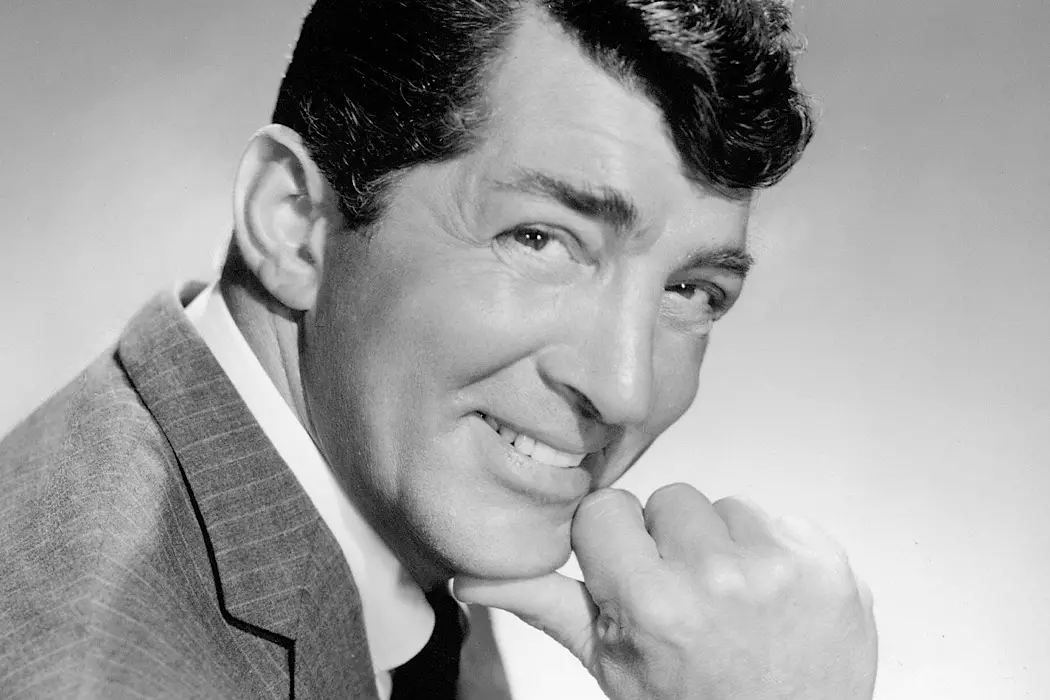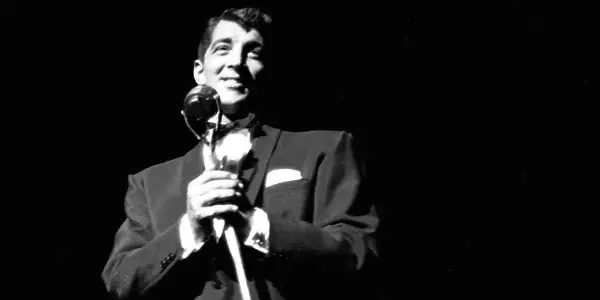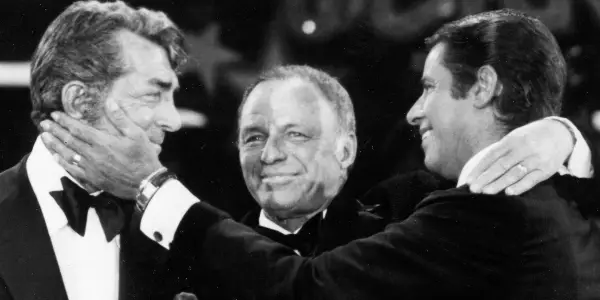Dean Martin: The King of Cool: A Tender Examination with Minor Revelations

Tynan loves nagging all his friends to watch classic movies…
If I’m to be perfectly honest, when I think of “The King of Cool,” my mind immediately goes to Steven McQueen. However, after watching Tom Donahue‘s new documentary on Dean Martin, it’s easy to see why everybody’s favorite singer-comedian-actor-Rat Packer is up for the crown. He had that certain je ne sais quoi. If it could be bottled, people would be rushing to buy it. Dean Martin was just that beloved.
Early on the term “menefreghista” is bandied about — this idea of being casually indifferent — of not giving a damn about something. However, what becomes plain is how there is this correlation between Martin’s cool persona, the one that everyone aspires to, and then his personal distance. It was hard to truly know him. Somehow these two elements seem to go hand in hand.
In the vein of Citizen Kane, the documentary sets out on the foolhardy task of finding Dean Martin‘s Rosebud: the puzzle piece to unlock what made him tick. This becomes the way into the story if you will — the metaphor to hang our hat on — but The King of Cool slowly begins to evolve into something else that’s more evident with time.
His Career
We learn Dino Crocetti grew up in modest Steubenville, Ohio where he took on a variety of different jobs from dealing cards to fighting as an amateur boxer. His break with Jerry Lewis is chronicled after they met on the nightclub circuit and formed one of the most lucrative comedy duos of all time. They were kings of the Colgate Comedy Hour playing up to the medium of Television and talking to the camera. Their series of films with Paramount was wildly popular throughout the 1950s. It worked because Lewis was the manic goofball, and Martin was his straight-man keeping him tethered with his witty spontaneity.

However, with their increasing fame and chafing personalities, their run could not last forever. Lewis was garnering more and more creative control, and after a mentorship with Frank Tashlin (Director of Artists and Model and Hollywood or Bust), he was ready to go out on his own as a triple-threat auteur. Dino was getting less and less of the pie. Norman Lear highlights a prevailing sentiment of the time that even the general public believed Lewis had most of the talent and Dean was very lucky to be along for the ride.
After 10 years, the beloved partnership ended acrimoniously, and yet both men proceeded to carve out illustrious careers. It’s a pleasure to see two of Martin’s most iconic early film performances receive their due. The first is the highly underrated Young Lions that found Martin holding his own in a WWII epic starring Marlon Brando and Monty Clift. It was the lynchpin film after his split with Lewis and the failure of his initial solo vehicle.
Clift was on the backend of his horrific car accident, and while he helped Martin hone his acting craft, Martin remained fiercely loyal to his new friend. Rio Bravo, from the following year, remains one of his most iconic performances opposite John Wayne, Ricky Nelson, and Angie Dickinson. It’s not a musical, but he brings his abilities to the picture’s one ballad, “My Rifle, My Pony, and Me,” in a perfectly realized musical aside.
Although Martin plays a recovering alcoholic in Bravo and maintained a drunk nightclub shtick, we learn this was all an act. Since the niche filled by the late, great Joe E. Lewis (see Frank Sintra in The Joker is Wild) was vacant, Martin was more than ready to fill the void. He used the persona to great effect helping propel himself to the apex of Vegas nightclub culture alongside buddies like Frank Sinatra and Sammy Davis Jr.
The Other Side of Dean Martin
Some of the best anecdotes happen when friends talk about the parties Dean Martin and his second wife Jeanne would throw on Saturday nights. Henry Jaglom recalls one of their gatherings. He went off to use the bathroom and when he was walking down the hall he heard a television. Peeking inside, Martin was sitting alone watching The Andy Griffith Show at his own party. Bob Newhart and George Schlatter both ruefully remember how Martin used to call the police on his own parties so the cops would come to report the complaint, and then he could get all the guests out of the house so he could go to bed!
However, the documentary also suggests there was a level of integrity to Martin, made evident through some (if not all) of his decisions. One of those was his choice not to attend John F. Kennedy‘s inauguration. His buddy Sammy Davis Jr. was barred because he was married to a white woman. An interracial couple was not going to fly even in the progressive world of Camelot where the harsh realities of racism still ruled the day. While Frank Sinatra got caught up in the Kennedy zeitgeist, it’s almost as if Martin could more easily discern some of the hypocrisies that politics breed.
Enduring Success
One of the most pleasurable elements of the documentary is watching how Martin’s career continually evolved to best suit his talents. The Dean Martin Show joined the bevy of variety shows and shot to the top with a hugely popular nine-season run with memorable guests including Dom DeLuise and Florence Henderson.
The success was predicated on Martin’s inalienable charisma. He didn’t allow the show to infringe on his affinity for the golf course, and he never rehearsed. For anyone else, this might sound like a disaster waiting to happen, but when the inevitable happened and he flubbed a line or note in front of the camera, his humanity just made the audience love him more. Every mistake felt so real and honest. The full spectrum of his spontaneous charm was accentuated, and he became a beloved figure in the living rooms of families across America all over again. There was a warmth behind his menefreghista.

And I almost forgot about it, but King of Cool gives a necessary portion of its time to acknowledge how Dean Martin is a perennial pillar of the Christmas music canon. If my own listening habits are any indication, he’s one of the great crooners alongside Bing Crosby, Frank Sinatra, and Nat King Cole. It would hardly seem like the holidays without him.
Dean Martin: King of Cool: Conclusion
In 1976, during a Muscular Dystrophy Association Telethon, Frank Sinatra engineered the on-air reunion of two of his longtime buddies: Dino and Jerry Lewis. This bit of reconciliation seems so important since these two men will be linked forever, and it highlights a theme that becomes increasingly apparent throughout the documentary.
Despite failed marriages and dissolved creative partnerships, the documentary’s Dean Martin always maintained the importance of family and friendships in his life. It seems like a striking coincidence that his favorite restaurant later in life was called La Famiglia.
Deana Martin suggests her dad’s Rosebud might be his favorite pasta: Pasta Fazool. While this might not be a totally satisfactory answer (similar to Kane) and the editing around the subject doesn’t quite do Kane justice, it does provide one last sentimental note to remember Dean Martin.
Again, it’s a reminder that the dinner table was central to Martin’s life because it came to represent something more. Breaking bread and sharing food with one another is such a simple yet powerful act of community. They’re reflected in these ever-changing spheres of family he seemed to be a member of all throughout his life. It’s a fine place to leave off with The King of Cool because it pulls back his exterior lightly and offers a mostly tender examination of Dean Martin. There’s no salacious muckraking and there are only a few minor revelations.
One last story is worth mentioning. Martin was understandably devastated when his son Dean Paul‘s plane went missing in 1987, and he was later confirmed dead. The tragedy shook him, but it also brought his friends and family out of the woodwork. One of them, who slipped into Dean Paul’s funeral unannounced, outside the prying eyes of the paparazzi, was his formerly estranged business associate: Jerry Lewis.
Figures like Dean Martin and Jerry Lewis can become complicated by a maelstrom of stories, conflicting points of view, and talking heads with all sorts of opinions. Oftentimes you know a man by their actions — their fruit — both good and bad. If you cut through all the noise, this one simple act speaks of love, affection, and reconciliation. These are the things worth building a legacy on. I don’t want to care about being cool. It doesn’t seem like Dino Crocetti did. Perhaps that was his secret. If we don’t exactly discover his Rosebud, maybe we get something even better.
Do you consider Dean Martin The King of Cool? If so, what qualities sum it up for you? Let us know in the comments!
Dean Martin The King of Cool was released on November 19th
Does content like this matter to you?
Become a Member and support film journalism. Unlock access to all of Film Inquiry`s great articles. Join a community of like-minded readers who are passionate about cinema - get access to our private members Network, give back to independent filmmakers, and more.
Tynan loves nagging all his friends to watch classic movies with him. Follow his frequent musings at Film Inquiry and on his blog 4 Star Films. Soli Deo Gloria.













